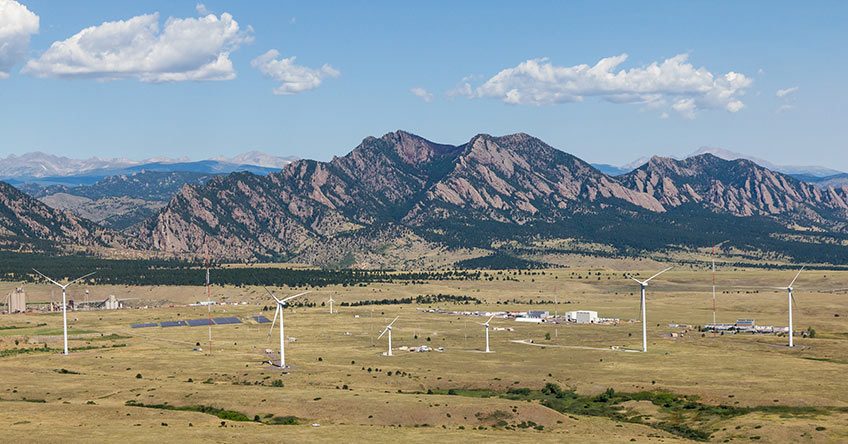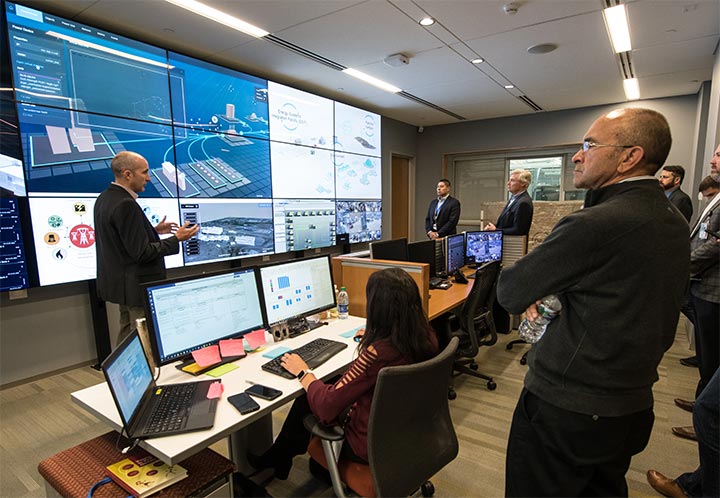NREL Welcomes Colorado’s First-Ever American Society of Mechanical Engineers Energy Sustainability Conference
Researchers Roll out a Welcome Mat to the Rockies with New Conference Tracks, Lab Tours, and High-Profile Speakers

At NREL's Flatirons Campus, researchers explore cutting-edge renewable technologies at the foothills of the Rockies. Photo by Lee Jay Fingersh, NREL
Spring in Colorado is always a time of renewal, but June 2020 looks to be especially refreshing. From June 7–11, hundreds of attendees from around the country will gather in Denver to present and ponder paradigm-pushing sustainability research at the American Society of Mechanical Engineers (ASME) 14th International Conference on Energy Sustainability (ES2020).
In Colorado for the first time, the conference will focus on innovative technologies, research and design advancements, utility-level systems integration, and all manner of renewable and sustainable energy solutions. Speakers and panelists will represent industry, associations, utilities, national laboratories, the U.S. Department of Energy, and leading universities. Additionally, Colorado's own National Renewable Energy Laboratory (NREL) is lending some local flavor to the conference—researchers are at the front and center of planning to help shape and enrich the conversation.
Sharing Research for a Sustainable Planet
As the only national laboratory solely dedicated to energy efficiency and renewable energy research, NREL is heavily involved in ES2020. Researchers are rolling out the welcome mat to the Rockies as they plan the conference theme, research tracks, workshops, and technical tours of NREL campuses in Golden and Boulder.
NREL concentrating solar power (CSP) and geothermal researcher Guangdong Zhu is serving as the ES2020 general program chair. Zhu selected the conference theme, For a Sustainable Planet. "What we do at NREL aligns well with many research directions at ASME," he says, "especially for this particular conference, which covers topics such as CSP, wind, buildings, hydropower, basic biofuels, sustainable societies, and any kind of emerging technology related to energy and sustainability—and, it gives us a chance to showcase our leadership in this area." As program chair, Zhu is organizing the conference's plenary panel, keynote speakers, and track chairs.
ES2020 is taking shape with the support of many other researchers from the NREL Buildings and Thermal Sciences Group. Mike Wagner, an expert in modeling and analysis within NREL's thermal sciences group, is the conference's technical co-chair. Residential buildings research group manager Dave Roberts, CSP researcher Zhiwen Ma, and geothermal researcher Amanda Kolker are each chairing technical tracks. Kolker commented on the broad range of research topics among the abstracts she has reviewed and her enthusiasm that geothermal technologies are part of the discussion. "Geothermal is neither the cheapest nor the fastest renewable technology to deploy, but given its 24/7/365 availability, high capacity factor, the heating opportunities it provides, and project lifetimes exceeding 100 years in some cases, it figures squarely into conversations about sustainable energy," she says.
New Research Topics for a Maturing Renewables Industry
"We've reached a point where each technology has advanced so much that the future
grid is going to rely on a combination of technologies, including storage. We need
to look at the best way to operate these technologies reliably and efficiently within
regional grid networks."
– Guangdong Zhu, ES2020 General Program Chair
New conference tracks this year dovetail with NREL's mission and showcase new directions in renewables research. A thermal and mechanical energy storage track reflects the growing need to increase the dispatchability of the renewable energy grid as the share of variable renewable technologies continues to expand. An energy hybridization track has also been added to explore greater efficiencies of combining renewable energy technologies such as geothermal and solar, CSP and solar fuel, solar and wind, and numerous others. "Hybridizing is important," Zhu says, "because we've reached a point where each technology has advanced so much that the future grid is going to rely on a combination of technologies, including storage. We need to look at the best way to operate these technologies reliably and efficiently within regional grid networks."
Special Speakers and Technical Tours

Technical tours of the NREL campus will include the Energy Systems Integration Facility in Golden, Colorado. Photo by Dennis Schroeder, NREL
Organizers are inviting renewable energy industry leaders to attend as plenary speakers, including confirmed speaker Geothermal Technologies Office Director for the Office of Energy Efficiency and Renewable Energy Susan Hamm. Additionally, a special "NREL Day" at the conclusion of the conference will feature all-day technical tours of the lab's South Table Mountain and Flatirons campuses, including NREL's unique Energy Systems Integration Facility and the National Wind Technology Center, the nation's premier wind energy, water power, and grid integration research facility. Software-focused workshops are also in the offing.
The agenda is taking shape in close coordination with ASME organizers. "We're glad to be partnering with NREL to bring quality topics and tracks to our upcoming conference. Dr. Zhu has been a long-standing member of ASME, and his leadership is invaluable in developing the programming of this event," says Mary Jakubowski, manager of conferences and events at ASME.
ES2020 organizers seek a diversity of participants, including legislators and private industry experts in addition to researchers and academics. Register for the conference beginning in February, submit a presentation abstract by March 1, and join us in June.

